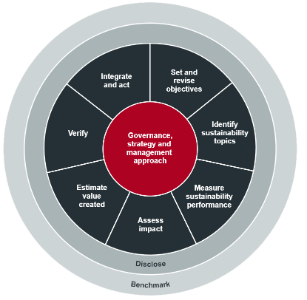Centre on Well-being, Inclusion, Sustainability and Equal Opportunity (WISE)
Measuring and managing business impacts on people’s well-being and sustainability
What is the contribution of businesses to people’s well-being and to the environment? How can businesses measure and manage their impacts? Building on the "Beyond GDP" agenda and on its work on measuring well-being, the OECD WISE Centre is collaborating with the community of businesses, investors, standard-setters and policy makers engaged in managing and measuring business impacts on people's well-being and sustainability.
Measuring business non-financial performance and impacts using a well-being lens
Businesses have a significant impact on people’s lives, whether as employees or workers, consumers, members of a community or as part of society as a whole. Our framework on measuring the non-financial performance of firms (see the recent working paper and policy insights) identifies four broad categories of stakeholders: employees, consumers, local communities, and society as a whole.
The measurement of the well-being of these stakeholders remains scattered. To respond to gaps in such measurement, our approach:
-
uses the OECD Well-being Framework as a basis to provide conceptual clarity and identify metrics across well-being dimensions
-
is rooted in OECD measurement guidelines, including on subjective well-being and the quality of the working environment, so that companies can align metrics with those used by the international statistical community
-
focuses on measuring the outcomes that matter to people, including inequalities between groups
-
captures both objective and self-reported and subjective aspects of well-being
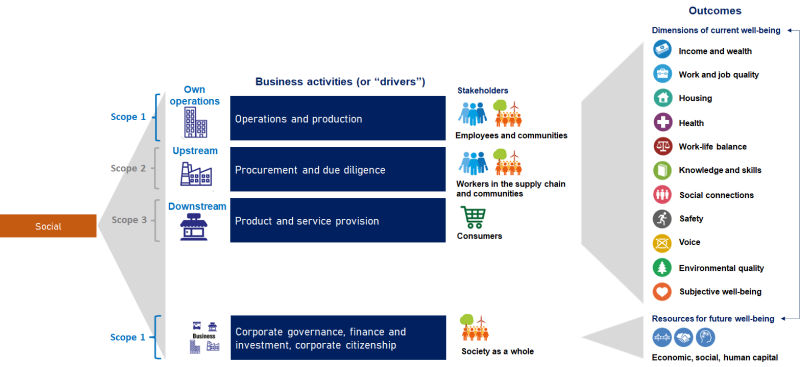
Source: OECD (2022), "Measuring the non-financial performance of firms through the lens of the OECD Well-being Framework"
Piloting a standardised OECD survey on employee well-being
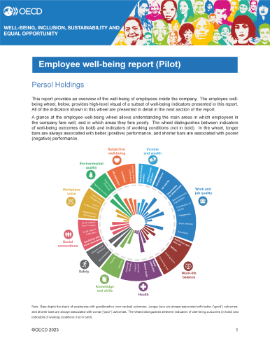 Employee well-being surveys are an important and rich potential source of data on business social performance, providing direct information about the lives of this stakeholder group. Currently, there is limited standardisation in the way businesses measure the well-being of their employees, impeding comparisons.
Employee well-being surveys are an important and rich potential source of data on business social performance, providing direct information about the lives of this stakeholder group. Currently, there is limited standardisation in the way businesses measure the well-being of their employees, impeding comparisons.
For this reason, the OECD WISE Centre has launched the OECD Employee Well-being Survey pilot, a standardised survey instrument that businesses can use to measure employee well-being and benchmark outcomes against that of peers. The survey:
-
provides a multi-dimensional overview of employee well-being across 10 dimensions
-
identifies vulnerabilities, inequalities and risks in employee working conditions and well-being
-
allows companies to compare performance with that of others
-
is aligned with OECD measurement guidelines, allowing comparisons with country-level statistics
An initial pilot was held among a group of companies in Japan in the fall of 2022. Access a sample employee well-being report of Persol Holdings, a Japanese human resource management company.
For information on the pilot and to find out how to participate in the next pilot survey, contact: well-being@oecd.org
Impact management and the Impact Management Platform
Impact management by enterprises, investors and financial institutions is necessary to achieve sustainability, promote well-being, manage idiosyncratic risks and mitigate system-wide risks. Impact management enables businesses to place a consideration of impacts in strategy, governance, and across its activities, with the aim of using information on impacts to take action and steer towards better outcomes for people and the natural environment.
To provide clarity on impact management and ensure coherence in the system of standards and resources, the OECD and Partner organisations and standard-setters have created the Impact Management Platform. Among others, the Impact Management Platform has developed the Actions of impact management, a consensus view of the steps that organisations can take to manage their impacts, and the System Map, a high-level visual of the currently available resources for organisations, investors and financial institutions to manage their sustainability impacts.
Key WISE Centre reports and publications on measuring business impacts
- Working paper: Measuring the non-financial performance of firms through the lens of the OECD Well-being Framework
- Policy insights: Measuring the social performance of firms through the lens of the OECD Well-being Framework
- Employee well-being report (pilot): Persol Holdings
- Working paper: Valuing business impacts in the areas of wage inequality and employee well-being
- Blog post by WISE Director Romina Boarini: Towards a culture change in how we think about and measure the “S” in ESG
- Working paper: Measuring the impact of businesses on people’s well-being and sustainability - Taking stock of existing frameworks and initiatives
- Guidelines on Measuring the Quality of the Working Environment
- Compendium of Selected Papers on Measuring the Impacts of Business on Well-Being and Sustainability
Other related reports and publications
- Industrial Policy for the Sustainable Development Goals: Increasing the Private Sector’s Contribution
- OECD reports on ESG investing
- Social Impact measurement for the Social and Solidarity Economy
- Social Impact Investment: The Impact Imperative for Sustainable Development
- OECD Due Diligence Guidance for Responsible Business Conduct
Related initiatives
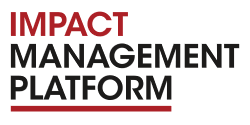 |
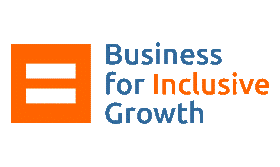 |
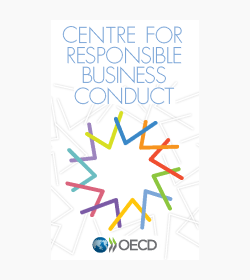 |
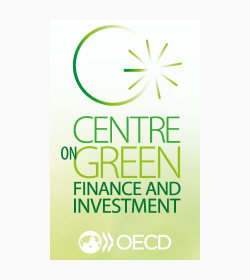 |
 |
|||
Contact us
For further information contact: wellbeing@oecd.org or follow us @OECD_STAT
Related Documents
